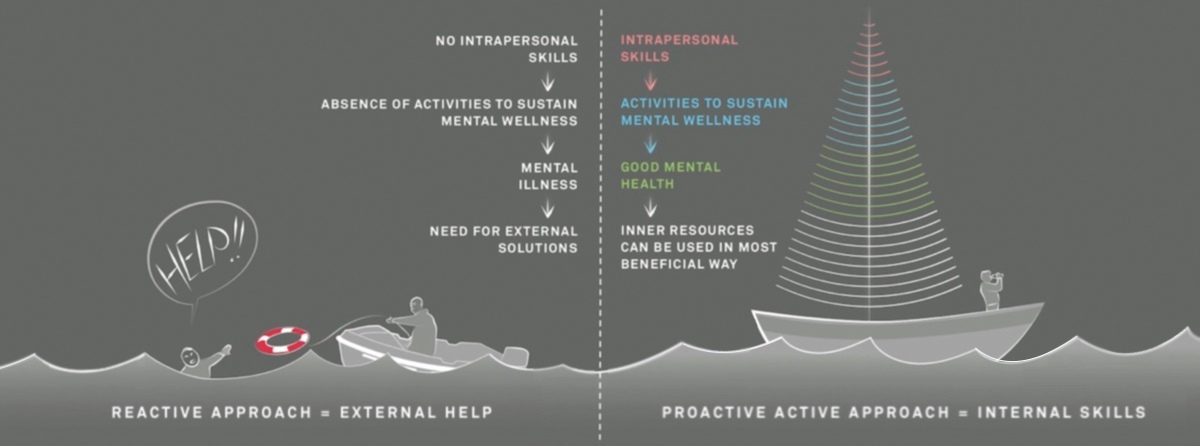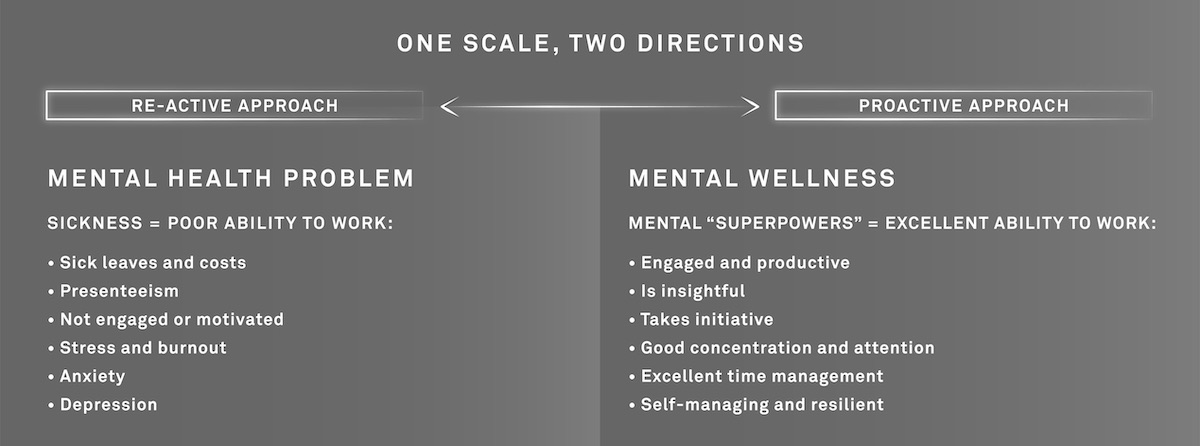Holistic refers to an approach that considers the entire system or entity as a whole, rather than focusing on separate parts or components in isolation. It notes and values the interconnectedness of various elements and seeks to comprehend how they interact and influence each other.
The holistic wellness concept is frequently implemented in healthcare and psychology, emphasizing the importance of addressing all aspects of an individual's well-being to achieve balance and harmony.
What is holistic wellness?
Holistic wellness represents a comprehensive approach to securing excellent health that encompasses all dimensions of a person's life: physical, emotional, mental, social and even spiritual. It recognizes all these aspects are interrelated thus neglecting one over another can have ripple effects on your wellbeing.
The holistic wellness approach aims to promote overall vitality by nurturing a harmonious lifestyle.
A holistic approach to mental wellness acknowledges the intricate interplay between various aspects of an individual's life and their psychological well-being. It goes beyond addressing singular symptoms or dealing with disorders and instead embraces a comprehensive strategy to ensure mental wellness.
How to benefit from holistic mental wellness?
A holistic mental wellness approach becomes personally sustainable when we understand how our inner domain is built and functions. Without such insights, it is challenging to change our automatic inner reactivity that causes most of the stress, burnout, anxiousness or formulates into severe mental health issues such as depression, anxiety disorders, etc.
However mental wellness is not about illnesses, it is about a state of inner wellbeing that allows you to maximize your own abilities so that you can work fruitfully and make a meaningful contribution to your family and community. Above all, mental wellness is about thriving and doing well in life.
Securing excellent mental and emotional well-being involves fostering awareness and the use of awareness-based intrapersonal skills. Mapping and managing thoughts, imaginations and emotions effectively is possible as is also practicing self-compassion.
Cognitive and holistic mental wellness focuses on using awareness as an inner tool to maintain mental and emotional clarity. This becomes possible when you consciously choose your thoughts and emotions instead of experiencing those as something triggered by external circumstances without your inner control mechanisms.
On this spot, the awareness-based inner leadership approach reduces your dependency on outer situations and allows you to identify your key role in how you respond to things and situations.
The role of intrapersonal skills
Learning awareness-based intrapersonal skills allows us to develop healthy thought patterns.
Mindfulness, as using awareness passively to become fully present and observe, represents the first step here. The active use of awareness (as being aware of where your awareness is) and learning to lead all your inner processes by aware choice is the ultimate goal here as it allows you to stay on top of any life situation.
Holistic mental well-being emphasizes the importance of leading your inner domain. Good intrapersonal leadership permits dealing with your own problems first. Thus, it is nurturing positive relationships, allowing you to stay away from negative inner turmoils and stress.

Reactive or treatment-centric mental health approach vs proactive and holistic mental wellness approach.
The wide application of holistic approaches within people's minds fosters the creation of supportive and creative work environments where employee engagement flourishes. For leaders, considering mental fitness as part of a broader whole enables them and their team members to maintain healthy communication within the organization and with its customers.
Additionally, a holistic approach acknowledges the role of spiritual well-being in mental health, encompassing a sense of meaning and a greater purpose that extends beyond one's egocentric desires.
The practical application of intrapersonal skills allows you to go beyond your egoistic needs and look at everything surrounding you as interconnected.
When you are irritated, all around you irritates you. Only when you are calm, you can solve any situation.
The benefit of holistic approaches is that you note that all deeds sooner or later come back to you. Thus, you can fine-tune your intention and apply kindness.
12 reasons to secure holistic mental wellness at work
Holistic mental wellness at work refers to a comprehensive approach to promoting mental well-being that takes into account various aspects of an individual's life and their interactions within the workplace. This approach recognizes that mental health is influenced by a multitude of factors, both within and outside the workplace environment.
We have listed 12 key benefits of promoting holistic mental wellness at work:
- Improved mind health: Prioritizing holistic mental wellness can lead to reduced stress and anxiousness therefore enabling to prevention of burnout, depression and anxiety disorders among employees. By securing intrapersonal education and addressing various aspects of their lives, such as work-life integration, physical health and mental well-being, employees are better equipped to manage their health.
- Increased productivity: When employees feel well, they are more likely to be focused, engaged and motivated at work. A positive mental state can enhance their ability to concentrate, problem-solve, and collaborate effectively, leading to improved productivity.
- Enhanced employee engagement: Organizations that invest in holistic mental wellness tend to maintain higher levels of employee engagement. Employees feel valued and supported when their overall well-being is considered, which can result in greater loyalty and commitment to their roles and the company.
- Reduced absenteeism and presenteeism: Proactive holistic mental wellness initiatives can help reduce absenteeism (missing work) and presenteeism (being at work but not fully productive due to health issues). When employees are mentally healthy, they are more likely to show up consistently and perform at their best.
- Supportive work culture: Organizations that prioritize a proactive mental wellness approach create a more positive and supportive work culture. This can lead to better interpersonal relationships, increased collaboration as well as sense of belonging and community within the workplace.
- Lower turnover rates: Employees are more likely to stay in a workplace that values their well-being. Proactive mental wellness training can contribute to lower turnover rates by fostering a sense of job satisfaction and loyalty.
- Attractive employer brand: Organizations known for their commitment to employee well-being are often seen as desirable places to work. Such workplaces can attract top talent seeking a work environment that values and supports their holistic health and permits work-life integration.
- Reduced workplace conflicts: When employees are mentally well and sharp, they tend to communicate more effectively, handle conflicts better and maintain a positive attitude. This can lead to a decrease in interpersonal conflicts within the workplace.
- Improving creativity and innovation: A calm mind equipped with intrapersonal skills and overall reduced stress levels will foster creativity, insights and innovation. Mentally well employees are more likely to contribute fresh ideas and approaches in challenging situations.
- Cost savings: While there is an initial investment in implementing a systematic proactive mental wellness approach, organizations often experience long-term cost savings due to lower healthcare expenses, decreased turnover and improved productivity. We have proven that there is up to tenfold ROI if you apply a workplace-wide proactive mental wellness approach.
- Legal and ethical responsibility: Many jurisdictions recognize employers' responsibility to provide a safe and healthy work environment, which includes securing psychological safety as well. Prioritizing a holistic and proactive mental wellness approach aligns with legal and ethical obligations and additionally allows employees to be proud of their workplace and its work culture.
- Better work-life integration: Work-life integration acknowledges that the demands of work and personal life are constantly evolving and that they can't be siloed off from each other. Our life goals should be in harmony with the work we do and define our work patterns so that our individual visions and missions align with what we do for a living.
Promoting holistic mental wellness at work represents a multifaceted approach that yields numerous benefits for both employees and their leaders.
By recognizing the interconnectedness of various aspects of well-being and fostering a nurturing environment, organizations can create healthier, more productive and more engaged teams that love what they do and thus are more likely to thrive.
|
Holistic mental wellness lifestyle
Holistic mental wellness equally involves developing a resilient lifestyle that incorporates training your mind and body regularly as well as securing proper nutrition, work-life integration and sufficient sleep.
The holistic mind health approach encourages efficient intrapersonal skills based stress reduction techniques that allow you to keep your mind well and use your hidden "mental superpowers".

On the left side, you find the current reactive and treatment-centric mental health approach. On the right side, you find the benefits of a holistic mental wellness approach.
The holistic approach also welcomes long nature walks and quiet time alone. Such restoring moments can include meditation, yoga, relaxation exercises or using mental wellness gym training. It acknowledges that a healthy mind thrives and is fit for work and having fun without consuming outer substances (For example: alcohol, recreational drugs or smoking, etc.) that can develop into addictions.
A holistic mental health agenda also promotes seeking professional help as soon as it is required and focuses on reducing the stigma associated with mental health challenges.
The holistic wellness approach acknowledges the significance of social connections and supportive workplaces and communities. It also recognizes the importance of aligning with one's values, beliefs and sense of purpose and notes that individuals may have their own unique needs and preferences.
The systematic proactive mental wellness approach that we promote encourages self-awareness, wider use of awareness and intrapersonal skills that support self-care practices, enabling individuals to make informed choices about their overall health and mental well-being.
By training your mind and integrating what you learn into your life and work, you cultivate resilience and enhance employee coping mechanisms.
Conclusion
The holistic approach to mental wellness aims to establish a harmonious equilibrium within oneself and the surrounding environment.
For you as a person application of a holistic mental wellbeing approach ultimately leads to improved mental health, good interpersonal relations, sustained focus and increased satisfaction with your work and life integration. You no longer sacrifice family life for work or the other way around.
Fostering resilience by training your mind while you are well being here your most efficient solution
We all face challenges and those can be relatively difficult to overcome if you lack mental sharpness and mental fitness. Being stressed is way too common and stressed people end up burning out sooner or later.
Mental well-being should be seen as something that encompasses cognitive fitness, continuous learning, stress reduction and burnout prevention techniques to keep the mind sharp and adaptable.
|





